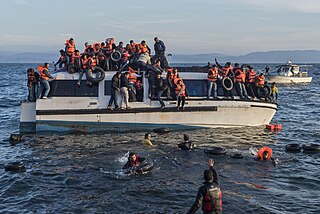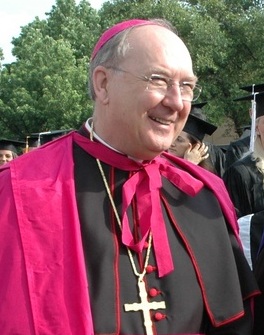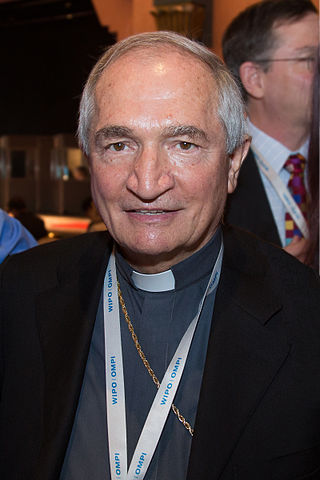Related Research Articles
The Roman Curia comprises the administrative institutions of the Holy See and the central body through which the affairs of the Roman Catholic Church are conducted. The Roman Curia is the institution which the Roman Pontiff ordinarily makes use of in the exercise of his supreme pastoral office and universal mission in the world. It is at the service of the Pope, successor of Peter, and of the Bishops, successors of the Apostles, according to the modalities that are proper to the nature of each one, fulfilling their function with an evangelical spirit, working for the good and at the service of communion, unity and edification of the Universal Church and attending to the demands of the world in which the Church is called to fulfill its mission.

The Dicastery for the Doctrine of the Faith (DDF) is the oldest among the departments of the Roman Curia. Its seat is the Palace of the Holy Office in Rome. It was founded to defend the Catholic Church from heresy and is the body responsible for promulgating and defending Catholic doctrine.

Forced displacement is an involuntary or coerced movement of a person or people away from their home or home region. The UNHCR defines 'forced displacement' as follows: displaced "as a result of persecution, conflict, generalized violence or human rights violations".

The Jesuit Refugee Service (JRS) is an international Catholic organisation with a mission to accompany, serve, and advocate on behalf of refugees and other forcibly displaced persons, that they may heal, learn, and determine their own future. Founded in November 1980 as a work of the Society of Jesus, JRS was officially registered on 19 March 2000 in Vatican City as a foundation. The impetus to found JRS came from the then superior general of the Jesuits, Pedro Arrupe, who was inspired to action by the plight of Vietnamese boat people. JRS has programmes in over 50 countries. The areas of work are in the field of education, emergency assistance, health care, livelihoods, reconciliation, and psychosocial support. JRS is also involved in advocacy and human rights work. This involves ensuring that refugees are afforded their full rights as guaranteed by the 1951 Geneva Convention relating to the Status of Refugees and working to strengthen the protection afforded to Internally displaced persons (IDPs). JRS's international headquarters is located in Rome at the Society's General Curia. The International Director is Rev. Thomas H. Smolich SJ.
The Pontifical Council for Justice and Peace was a pontifical council of the Roman Curia dedicated to "action-oriented studies" for the international promotion of justice, peace, and human rights from the perspective of the Roman Catholic Church. To this end, it cooperates with various religious institutes and advocacy groups, as well as scholarly, ecumenical, and international organizations.
The Pontifical Council for the Pastoral Care of Health Care Workers was a pontifical council set up on 11 February 1985 by Pope John Paul II who reformed the Pontifical Commission for the Pastoral Assistance to Health Care Workers into its new form in 1988. It was part of the Roman Curia.
A pontifical council was a mid-sized department or dicastery of the Roman Curia, the central organization responsible for assisting the Pope in the governance and oversight of the Catholic Church. Such a council had a cardinal or archbishop as its president and was restricted in its activities in comparison with the larger parts of the Curia.
Pastor bonus is an apostolic constitution promulgated by Pope John Paul II on 28 June 1988. It instituted a number of reforms in the process of running the central government of the Catholic Church.

Kevin Joseph Farrell KGCHS is a prelate of the Catholic Church who has been a cardinal and served as prefect of the Dicastery for the Laity, Family and Life since 2016. In 2019 he was appointed camerlengo of the Catholic Church as well.
The Pontifical Council for the Pastoral Care of Migrants and Itinerant People was a pontifical council of the Roman Curia. The council, established by Pope John Paul II on 28 June 1988, was dedicated to the spiritual welfare of migrant and itinerant people.

Silvano Maria Tomasi C.S. is an Italian prelate of the Catholic Church who has served as the Special Delegate to the Sovereign Military Order of Malta since 1 November 2020. He was the Permanent Observer of the Holy See to the United Nations in Geneva from 2003 to 2016. He previously worked in the Roman Curia, became an archbishop in 1996, and represented the Holy See as an apostolic nuncio in Africa from 1996 to 2003.
The Dicastery for Promoting Integral Human Development is a dicastery of the Roman curia.

Michael F. Czerny is a Czechoslovakian-born Canadian prelate of the Catholic Church who has been prefect of the Dicastery for Promoting Integral Human Development since 23 April 2022, after serving as interim prefect for several months. He was under secretary of that dicastery's Migrants and Refugees Section from 2017 to 2022. Pope Francis made him a cardinal in 2019.
Praedicate evangelium is an apostolic constitution reforming the Roman Curia and was published and promulgated on 19 March 2022 by Pope Francis; the document took effect on 5 June 2022.
Fabio Baggio CS is an Italian Catholic priest. Since 2017, he has served as one of the Vatican's officials in charge of migrants and refugees. He has spent his career as a missionary, including eight years in Latin America and eight years in the Philippines. He supports improved legal entrance for migrants and refugees.

Angels Unawares is a bronze sculpture by Timothy Schmalz installed in St. Peter's Square in the Vatican since September 29, 2019, the 105th World Migrant and Refugee Day.
Fratelli tutti is the third encyclical of Pope Francis, subtitled "on fraternity and social friendship". In the document, Francis states that the way the COVID-19 pandemic was managed by world countries has shown a failure in global cooperation. The encyclical calls for more human fraternity and solidarity, and is a plea to reject wars.
Events in the year 2021 in Vatican City.
The Letter: A Message for our Earth is a 2022 documentary film presented by YouTube Originals, telling the story of the Laudato Si' encyclical by Pope Francis.
References
- ↑ "Migrants and refugees at the heart of Pope's new 'Motu Proprio'" . Retrieved 2017-01-08.
- ↑ "Pope to oversee migration issues in shakeup of Vatican offices". Reuters. 2016-08-31. Retrieved 2017-01-08.
- ↑ "To participants in the World Meeting of Popular Movements (5 November 2016) | Francis". w2.vatican.va. Retrieved 2017-01-08.
- ↑ "Pope Francis appoints Jesuit and Scalabrini priests to new Vatican department for refugees". America Magazine. 2016-12-14. Retrieved 2017-01-08.
- ↑ McElwee, Joshua J. (31 August 2016). "Francis creates new Vatican office for charity, justice, peace, migration". National Catholic Reporter. Retrieved 31 August 2016.
- ↑ "Message of His Holiness Pope Francis for the 104th World Day of Migrants and Refugees (15 August 2017) | Francis". www.vatican.va. Retrieved 2020-10-05.
- ↑ Czerny, Michael. ""L'IMPEGNO DELLA CHIESA IN TEMA DIACCOGLIENZA E INCLUSIONE DI MIGRANTI E RIFUGIATI"" (PDF). Migrants and Refugees Section.
- ↑ "Vatican's Migrants & Refugees Section issues weekly bulletin on Covid-19". Vatican News. 2020-06-02. Retrieved 2020-11-16.